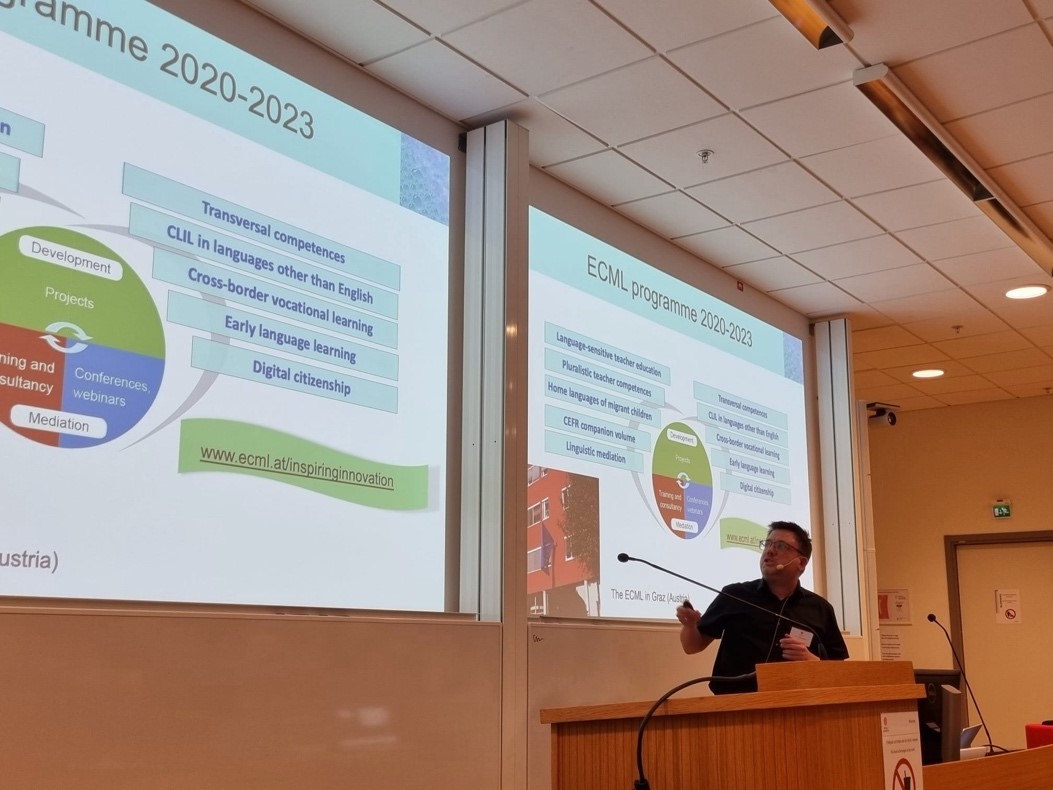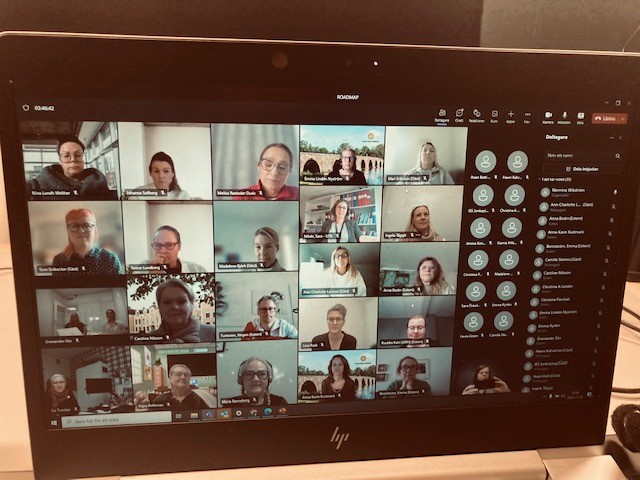News
12.08.2025
DECODE network meeting: discussing the importance of developing competences for democratic culture (CDC) in young learners through language education
Four DECODE project team members and their ECML consultant met with 19 teacher educators, teachers and researchers at the network meeting which was held at the ECML in Graz, Austria, on 24-25 June 2025. The participants were from Belgium, Bosnia and Herzegovina, Croatia, Germany, Greece, Ireland, North Macedonia, Slovenia, Spain, Sweden, and Switzerland.
During the two-day meeting, participants explored how to foster competences for democratic culture (CDC) in young learners through language education. On the first day, the team introduced the CDC model and discussed challenges in language education, the role of CEFR tools, and principles for developing CDC-related materials. A template for CDC materials was presented, and participants shared best practices and identified teachers’ needs. On the second day, they collaborated in groups to create and present initial CDC teaching materials, offering feedback on the template. Five of the network participants also shared highly interesting testimonials (see below) about CDC’s relevance in their professional contexts and the value of the DECODE project. The meeting strengthened understanding of CDC and highlighted the importance of collaboration for successful implementation of the DECODE project.
Authors: Emina Jelešković, Martina Kramar
- ECML project website “Developing competences for democratic culture for young learners through language education” (2024-26) (available in English and German): www.ecml.at/decode
- Video testimonials of network participants from Bosnia and Herzegovina, Greece, Germany, Ireland, and Sweden: see Recent developments
02.01.2024
Teacher feedback on language sensitivity: ECML projects at the SKOLU 2023 in Uppsala, Sweden
What are the professional competences required by language teachers in order to provide useful feedback to their learners? In October 2023, the University of Uppsala (Sweden) hosted the Scandinavian conference for language teachers and teacher educators (SKOLU – Skandinavisk konferens för lärare och lärarutbildare i språk) dedicated to the topic of feedback. Lukas Bleichenbacher, lecturer at the University of Teacher Education St.Gallen in Switzerland, was invited to deliver a workshop for participants to reflect on how giving feedback involves a whole range of professional competences. The discussion was illustrated with references to a range of materials produced by the European Centre for Modern Languages (ECML) of the Council of Europe, with a focus on the new Building blocks for planning language-sensitive education resource website. The participants shared their insights on various teacher competences required for feedback, concluding with a focus on how feedback involves plurilingual, intercultural and cooperative competences, alongside pedagogical ones.
Lukas Bleichenbacher
Mr Bleichenbacher’s participation at the event was enabled through the ECML’s national support scheme.

30.11.2022
Supporting the language(s) of schooling: the Roadmap workshop in Sweden (10-11 November 2022)
Date and venue of the event: 10-11 November 2022, online workshop
Local organiser: Pernilla Sundström Fast, Head of Unit, Swedish National Agency for Education / National Curricula/ Pre-school and Compulsory School
Experts and moderators: Nermina Wikström, Director of Education, Swedish National Agency for Education / National Curricula/ Pre-school and Compulsory School, and Katri Kuukka, Counsellor of Education, Finnish National Agency for Education.
Participants: More than 40 primary and secondary school teachers in the different school subjects, school leaders, policymakers and decision-takers.
The Swedish National Agency for Education and the European Centre for Modern Languages (ECML) organised a 2-day workshop entitled “Supporting the language(s) of schooling – The ROADMAP ” as the online session.
The workshop took place on the 10th and 11th of November 2022 and was attended by more than 40 participants who showed a great interest and dedication in the topic. The aim of the experts and moderators, Nermina Wikström and Katri Kuukka, was to give the participants an overview of the Roadmap project, including a presentation of the outcomes of the project, while conducting a training session focusing the hands-on activities related to language development. During the workshop the participants had the opportunity to see some examples of promising practices, use the self-assessment tool in practice, get to know the Roadmap database and to set up the outlines of a school development plan for their own school.
Since sharing thoughts and experiences was an important part of the workshop, the participants had the possibility to discuss different topics in pairs and in smaller groups. The participants discussed the role of language(s) of schooling as a backbone of education as well as the challenges of plurilingual and intercultural education. Other topics were the importance of adapting a whole-school approach, school culture and leadership, the key ideas of the Roadmap-project and benefits for the school, areas and dimensions, self-assessment tool and guide, survey statements and customized school report.
The workshop aimed to provide a “learning by doing-opportunity” as the participants familiarized themselves with the different parts of the user-friendly Roadmap-material, sharing their findings in the common work platform Padlet.
This two-day online workshop received favourable comments from the participants, who stated that they advanced their knowledge and skills, exchanged opinions within the working groups and with the experts and shared ideas and experiences concerning their own involvement in the work with language(s) of schooling. According to the participants` evaluation the workshop provided a good combination of activities and information. The participants found the presented approach and materials very useful for their practice.
In conclusion, it has been a privilege for the Swedish National Agency for Education to take part in this project and to contribute to the Roadmap with our expertise. We are very satisfied with the outcome, and we believe that this workshop will contribute in the most positive way to support the language(s) of schooling. We would like to take the opportunity to thank the European Centre for Modern Languages (ECML) for all the support we have been given in organising the workshop in Sweden.
For those countries which have not yet had the opportunity to host this workshop, we strongly recommend it. It was great fun!
Pernilla Sundström Fast

04.01.2022
Action research communities for language teachers: interculturality & the Language classroom
Dates and format: online event, 18 October 2021, 1-2 November 2021, 14 December 2021.
Local organiser: Linnaeus University and Karlstad University, Sweden.
ECML moderators: Christine Lechner, Angela Gallagher-Brett and Larisa Kasumagic.
Number of participants: pre-workshop: 21 participants; main workshop: 11 participants.
Background of the participants: teacher educators and language teachers (German, Spanish, French, English, Swedish as a second language).
Action Research Communities offer language teachers and teacher educators excellent opportunities to increase their intercultural awareness and reflect on how to integrate intercultural learning in their teaching practice. In addition, it can serve as a springboard for collaborations between teachers and teacher educators. During the workshops the participants experienced an exchange of ideas on how to implement intercultural and pluralistic approaches in the language classroom.
The theoretical insights into AR methods and interculturality, practical examples and materials presented by the ECML moderators Christine Lechner, Angela Gallagher-Brett and Larisa Kasumagic inspired the participants to plan their own projects and to discuss them in a group setting. Invited guest lecturers added new perspectives to the topic.
The moderators had also put together an extensive collection of material, including PowerPoint presentations, examples and checklists, which the participants can use in the future. Collaborative tools such as Padlet enabled the participants to post their ideas and projects and served as a space for reflection. The balance of theoretical input on ARC and interculturality, practical examples and time to exchange ideas was very much appreciated by the participants.
The participants were encouraged to present their own project ideas of classroom activities where interculturality should be a main part of the activity. In moderated group discussions, the participants were helped to develop their projects further. The atmosphere was constructive and encouraging, which was reflected in the lively discussions. The online format worked very well.
All in all, the workshop series provided the participants with a multitude of ideas, materials and approaches that they can implement in their lessons. The Action Research Framework is a useful tool for reflecting on and developing teaching practices.
Corina Löwe, Linnaeus University, and Brita Bodin, Karlstads University
Contact:
[email protected]
[email protected]
More information:
ECML training and consultancy offer for member states “Enhancing language learning and teaching through action research communities for language teachers”
*****
News item in Swedish
Action Research Communities som metod ger både språklärare och lärarutbildare goda möjligheter att stärka sin interkulturella medvetenhet och samtidigt reflektera över hur interkulturellt lärande kan integreras i klassrumspraktiken. Dessutom kan ARC bli en språngbräda för samarbete mellan verksamma lärare och lärarutbildare. Under workshopparna fick deltagarna möjlighet att utbyta tankar och idéer om hur man bäst inkluderar ett interkulturellt perspektiv och mångfaldsfrågor i språkklassrummet.
ECML:s workshopledare, Christine Lechner, Angela Gallagher-Brett och Larisa Kasumagic, bidrog med en teoretisk inblick i ARC som metod och gjorde även en grundlig presentation av ämnet interkulturalitet. Inbjuda gästföreläsare tillförde nya perspektiv. Innehållet i workshopparna inspirerade deltagarna att planera egna projekt och att diskutera dem i olika gruppkonstellationer.
ECML:s samtalsledare har också sammanställd ett användbart material som innehåller PowerPoint-presentationer, exempel och check-listor som workshopdeltagarna har fri tillgång till. Verktyget Padlet användes som samarbetsyta och fungerade mycket väl. Här kunde deltagarna ladda upp sina idéer och projekt och även både ge och få feedback. Det är tydligt att deltagarna uppskattade balansen mellan teorier kring ARC och interkulturalitet och utrymmet för praktiska exempel och erfarenhetsutbyten.
Workshopen inspirerade alltså deltagarna att utarbeta projekt för klassrumsundervisning där ett interkulturellt perspektiv var fokus. Alla fick också god hjälp att utveckla sina projektidéer i de ledda samtalsgrupper som ingick i workshopparna. Diskussionerna var livliga i grupperna och konstruktiva tankar och förslag växte fram. Online formatet fungerade utmärkt väl för workshopen.
Sammanfattningsvis menar vi att workshopdeltagarna fick med sig mycket matnyttigt material och massor med nya uppslag som lätt kan appliceras på klassrumssituationer. Action Research Communities är ett användbart verktyg för reflektion och för att utveckla sin egen undervisningspraktik.
Författare:
Dr. Corina Löwe, Linnaeus University, and Brita Bodin, Karlstad University
Kontakt:
[email protected]
[email protected]